The NFRMPO holds periodic Calls for Projects to award federal funding to transportation projects. The most recent Call for Projects was held in 2018-2019 for funding in Fiscal Years (FY) 2022 and 2023. The previous Call for Projects was held in 2016 for funding in FY2020 and 2021.
Member communities have the opportunity to apply for funding from three federal programs in the NFRMPO’s Call for Projects: Congestion Mitigation & Air Quality Improvement (CMAQ); Surface Transportation Block Grant (STBG), formerly STP-Metro; and Transportation Alternatives (TA), formerly TAP. These funding sources were carried forward in the FAST Act. Learn more about each funding source by reading the respective sections below.
Projects are scored by a subcommittee composed of TAC members and the Northern Colorado Bicycle and Pedestrian Collaborative. NFRMPO staff lead the discussion and the process, but are not involved in project selection.
Multimodal Options Fund (MMOF)
The NFRMPO Multimodal Options Fund (MMOF) Call for Projects awarded State funding to 13 projects and was approved by Planning Council on April 7, 2020.
A total of $5.6M for the NFRMPO was established by the Colorado Department of Transportation (CDOT) through Senate Bill (SB) 2018-001 to build a complete and integrated multimodal system. The NFRMPO Planning Council approved two funding set-asides for projects sponsored by the NFRMPO: Expansion of the Mobility Program including creation and operation of a One Call/One Click Center and staff support, and the North Front Range Premium Transit Analysis.
Additionally, a call for projects was held, with a total of 14 project applications submitted, 13 of which were scored on February 11, 2020 by the Scoring Committee (one project application was withdrawn by the sponsor prior to scoring). The Scoring Committee included voting members from each of the communities that submitted applications, as well non-voting members which were additional community staff, CDOT, and NFRMPO staff.
The projects were ranked highest to lowest based on the scoring criteria and point system identified in the 2019 NFRMPO MMOF Call for Projects Guidelines. The Scoring Committee recommended fully funding 12 projects and partially funding one project. Planning Council approved this recommendation, shown in Table 1, at their April 7, 2020 meeting.
Table 1. MMOF Call for Projects Recommendation Summary Table
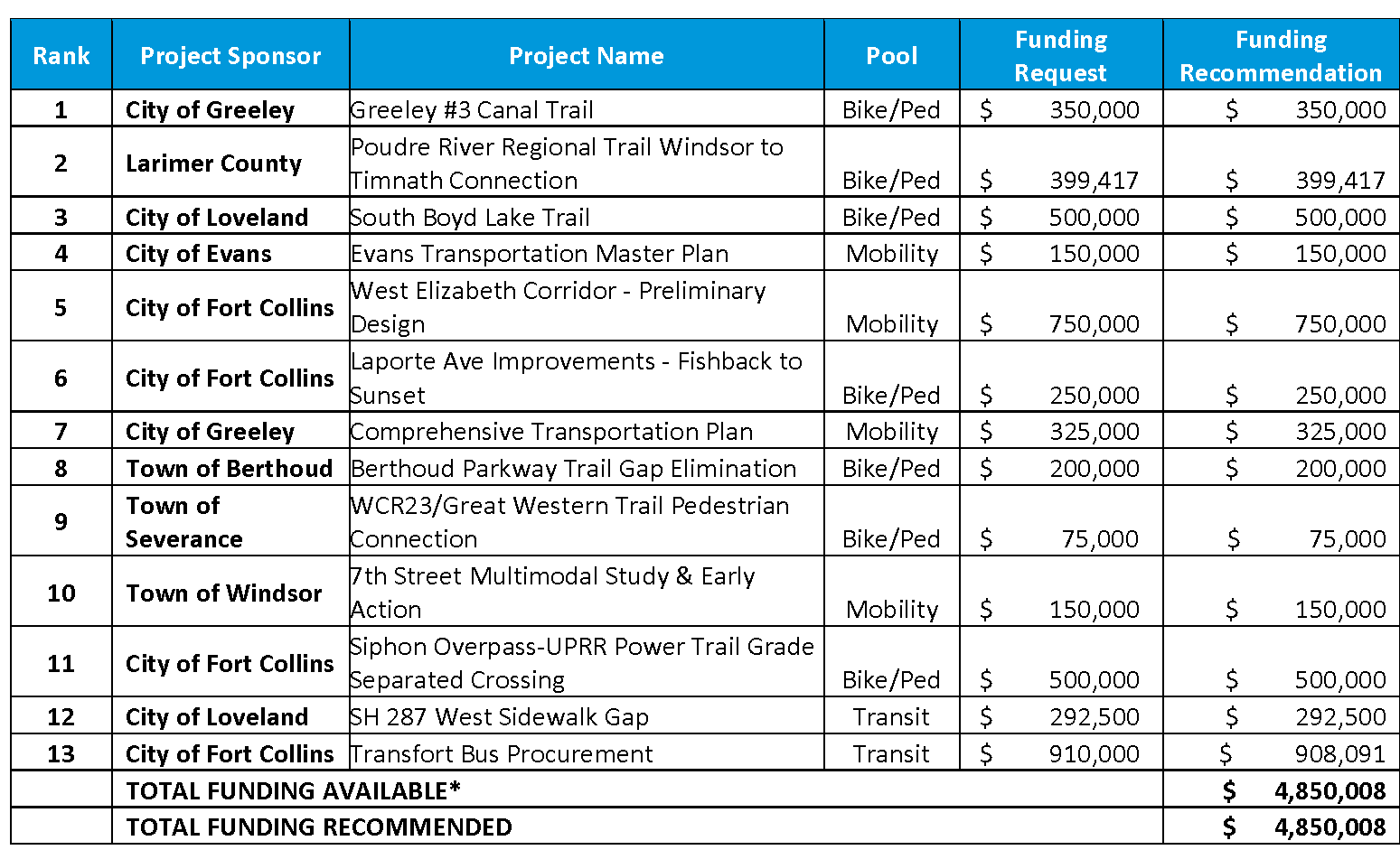
* Total Funding Available equals $5,575,008 available from the State minus the Planning Council approved set asides of $600,000 for the Expansion of the Mobility Program and the $125,000 for the Premium Transit Analysis.
The locations of the funded projects are displayed in Figure 1.
Figure 1. MMOF Selected Projects Map
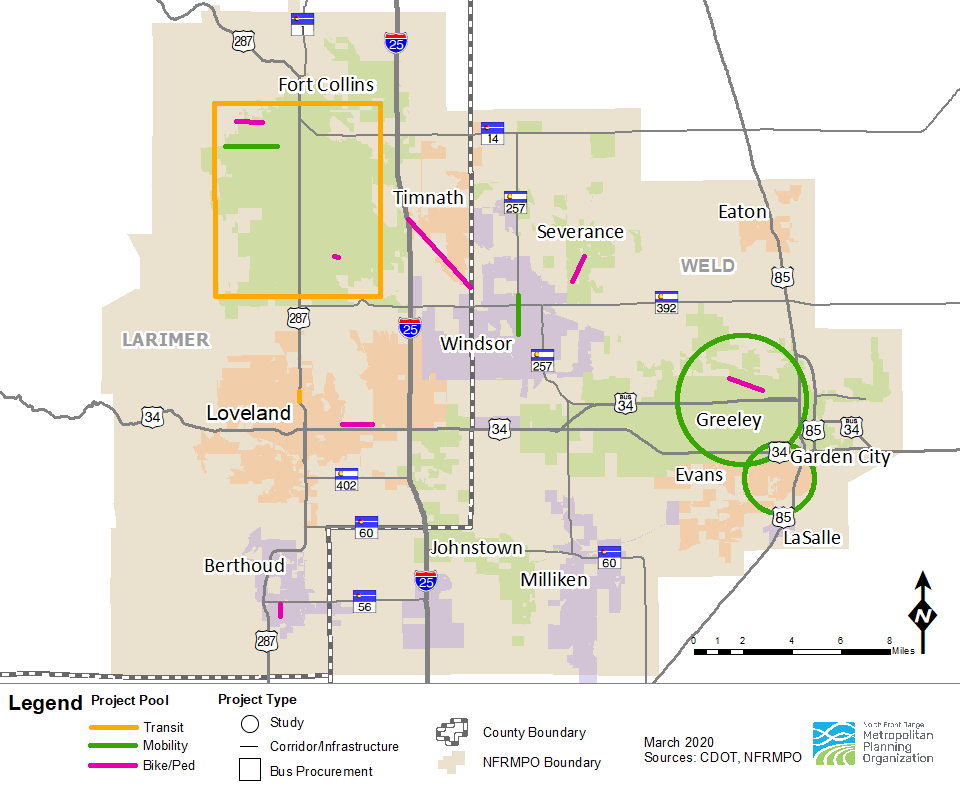
FY2022-2023 Call for Projects
The NFRMPO FY2022-2023 Call for Projects awarded CMAQ, STBG, and TA federal funding to 10 projects and was approved by Planning Council on March 7, 2019.
A total of 18 project applications were submitted during the Call. The CMAQ and STBG applications were scored on January 8, 2019 by the Scoring Committee, which included voting representatives from the communities of Evans, Fort Collins, Greeley, Loveland, and Weld County and non-voting representatives from the Colorado Department of Transportation (CDOT), Federal Highway Administration (FHWA), NoCo Bike & Ped Collaborative (NoCo), Regional Air Quality Council (RAQC), and NFRMPO staff. Membership on the Scoring Committee was open to all Technical Advisory Committee (TAC) members. The TA application was reviewed by NoCo on January 9, 2019. The number of applications and awards by funding program are shown in Table 2.
Table 2: FY2022-2023 Call for Projects Overview

The 11 CMAQ projects submitted to the Call were ranked by the Scoring Committee based on their emissions benefits and contribution to achievement of targets using the scoring criteria and point system identified in the 2018 Call for Projects Guidebook. Based on the recommendation of the Scoring Committee, all projects above the red line received a partial or full funding award as shown in Table 3. Three projects were fully funded, two projects were partially funded, and six projects were unfunded.
Table 3: FY2022-2023 CMAQ Awards
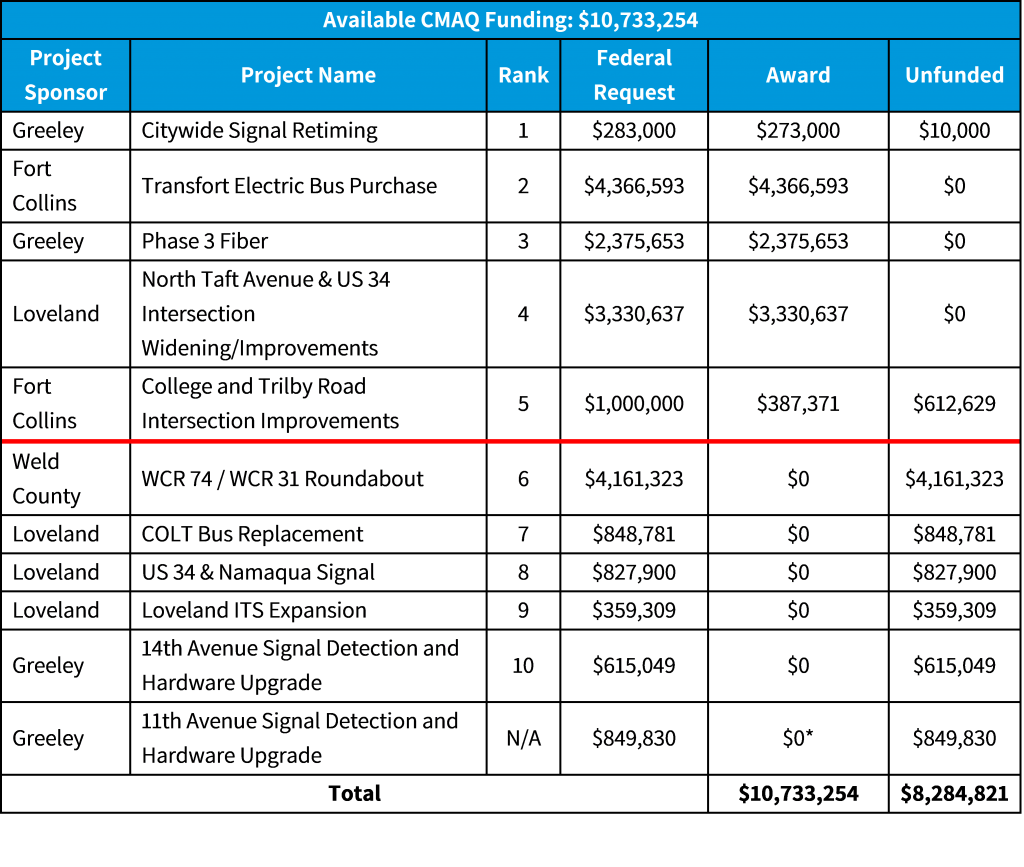
*Project deemed ineligible: applicant did not submit CDOT mini application or CDOT letter of support. Project could receive funding via CDOT.
Of the $7,834,286 available in federal STBG funding, the Planning Council designated $5,437,613 for Large Communities and $2,396,673 for Small Communities. Six project applications were submitted for STBG funding: three from Large Communities and three from Small Communities. The Scoring Committee ranked the STBG projects using the scoring criteria and point system identified in the Guidebook.
Based on the recommendation of the Scoring Committee, four STBG projects received full funding, including two from Small Communities and two from Large Communities, as shown in Table 4. An additional $428,382 federal STBG funding was available to be awarded; however, instead of receiving partial funding, the City of Greeley and the Town of Windsor requested to waitlist their projects. If additional STBG funding becomes available to provide substantial partial funding or full funding to the waitlisted projects, the applicants could opt to receive the funding at that time.
In addition, the Regional Air Quality Council (RAQC) was awarded a $25,000 per year set-aside of STBG funding in FY2022 and FY2023 to conduct ozone modeling of the North Front Range region.
Table 4. FY2022-2023 STBG Awards
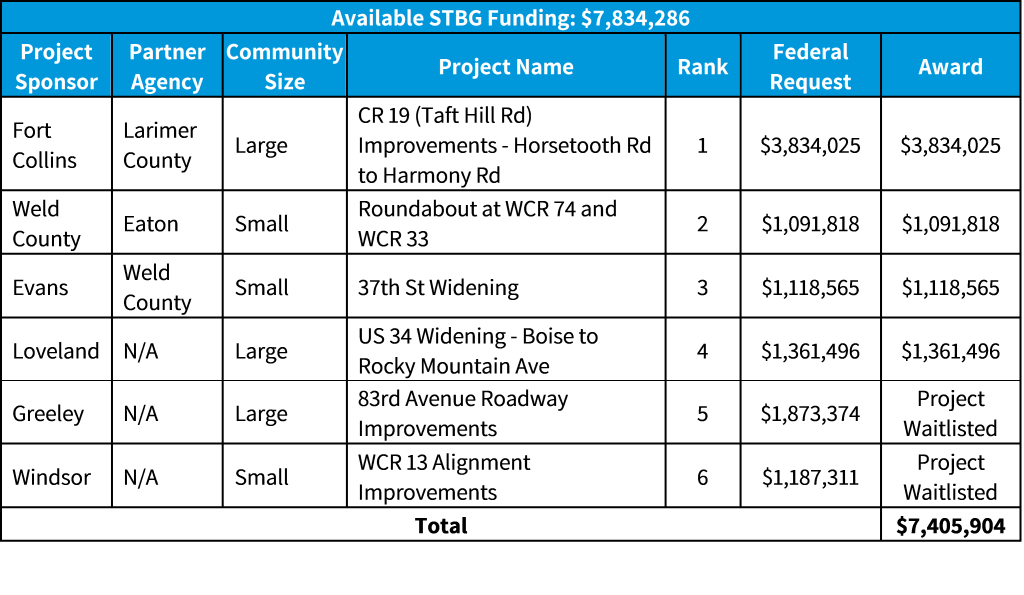
Only one TA application was submitted to the Call. The application was reviewed and recommended for full funding by NoCo, as shown in Table 5.
Table 5. FY2022-2023 TA Award

The locations of the unfunded, partially funded, and fully funded project applications as awarded in the FY2022-2023 Call for Projects are displayed in Figure 2. Changes to projects such as changes to project scope, sponsor, and federal funding amount may occur via Amendments and Modifications to the Transportation Improvement Program (TIP). For the latest project information, view the TIP at https://nfrmpo.gtstaging.com/tip/.
Figure 2: FY2022-2023 Call for Projects Applications and Awards
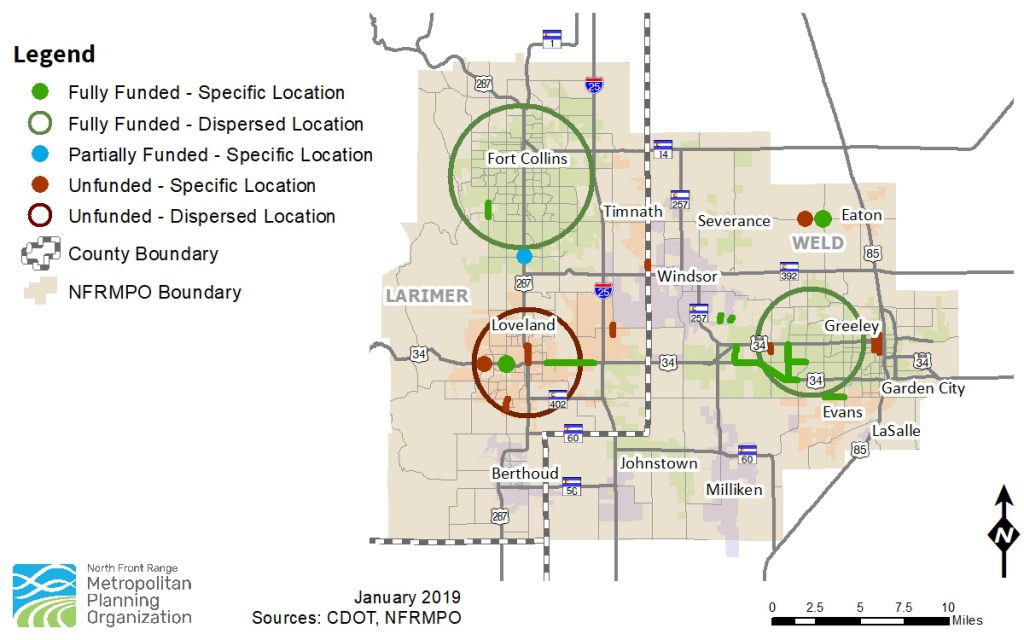
FY2022-2023 Call for Projects Application Materials
2018 Call for Projects Guidebook
CMAQ ITS Description
CDOT Mini-Application / Request for Support
CMAQ Application
STBG Application
TA Application
FY2020-2021 Call for Projects
The NFRMPO FY2020-2021 Call for Projects awarded CMAQ, STBG, and TA funding to 15 projects and was approved by Planning Council on November 3, 2016.
A total of 17 project applications were submitted during the Call. The applications were scored on September 21, 2016 by the Scoring Committee, which included representatives from Evans, Fort Collins, Greeley, Loveland, Severance, Larimer County, Weld County, Transfort, the Colorado Department of Transportation (CDOT), and the Regional Air Quality Council (RAQC). Membership on the Scoring Committee was open to all Technical Advisory Committee (TAC) members. The number of applications and awards by funding program are shown in Table 6.
Table 6: FY2020-2021 Call for Projects Overview

The 10 CMAQ projects submitted to the Call were ranked by the Scoring Committee based on their emission calculations, as shown in Table 7. Based on the recommendation of the Scoring Committee, all projects above the red line were funded at the award amount shown. The Scoring Committee recommended the Town of Johnstown submit their project to the Charge Ahead Colorado call for projects, which would allow the project to be funded sooner than FY2021. The Fort Collins project was not awarded funding as its score was too low. Any additional FY 2020/FY2021 CMAQ funds will be awarded to the partially funded projects based on their project scoring rank.
Table 7: FY2020-2021 CMAQ Awards
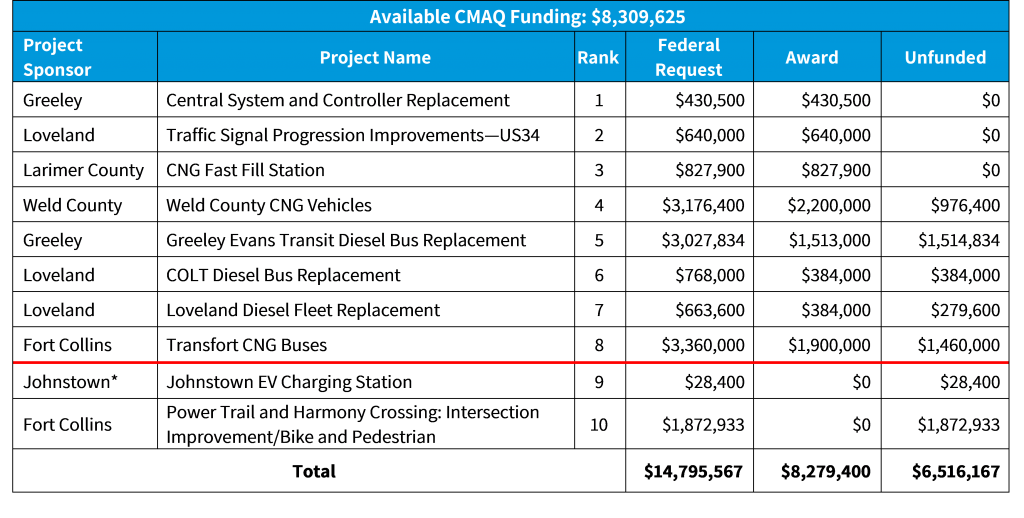
*Scoring committee recommended applicant apply for the Charge Ahead Colorado Call.
STBG projects were scored and awarded by category: Small Community and Large Community. Two Small Community STBG applications were submitted to the Call. Based on the recommendation of the Scoring Committee, both Small Community STBG projects were fully funded, as shown in Table 8.
Table 8: FY2020-2021 STBG Awards — Small Communities

Four Large Community STBG applications were submitted to the Call. Based on the recommendation of the Scoring Committee, the Larimer County project was fully funded through a combination of STBG and TA funds and the Fort Collins, Greeley, and Loveland projects were funded at 77.95 percent of the difference between the communities’ requests and STBG targets, plus $102,527. The STBG – Large Community awards are shown in Table 9.
Table 9: FY2020-2021 STBG Awards — Large Communities
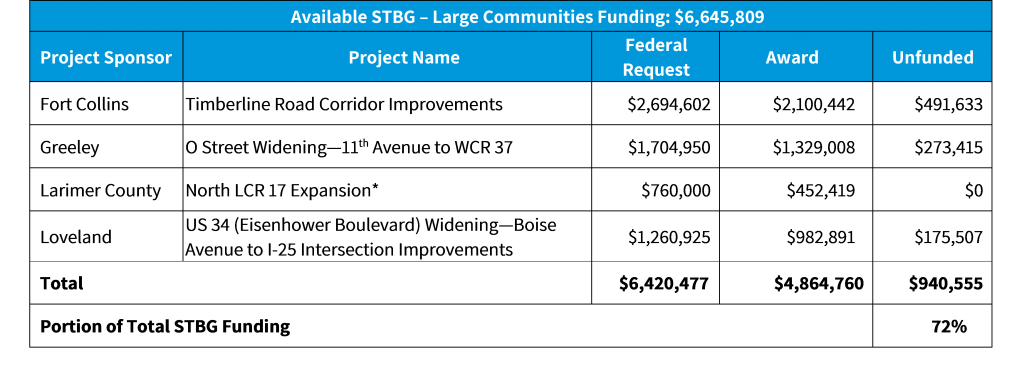
*The Larimer County North LCR 17 Expansion was fully funded with a combination of STBG and TA funds. The project was awarded $452,419 in funding from STBG and $307,581 in funding from TA. This was done so more funding could be put toward STBG projects, as well as to assign TA funds for bike lanes on RNMC #8, which is part of the North LCR 17 Expansion project.
Only one TA application was submitted to the Call. Based on the recommendation of the Scoring Committee, the project was funded at $250,000 to allow Johnstown to meet federal standards for the trail’s construction, as shown in Table 10. The remainder of the TA funding, $307,581, was awarded for bicycle and pedestrian improvements for the Larimer County STBG project as it included improvements to one of the Regional Non-Motorized Corridors (RNMC #8).
Table 10: FY2020-2021 TA Awards

*See Table 9 note
The locations of the unfunded, partially funded, and fully funded project applications as awarded in 2016 are displayed in Figure 3. Changes to projects such as changes to project scope, sponsor, and federal funding amount may occur via amendments and modifications to the Transportation Improvement Program (TIP). For the latest project information, view the TIP at https://nfrmpo.gtstaging.com/tip/.
Figure 3: FY2020-2021 Call for Projects Applications and Awards
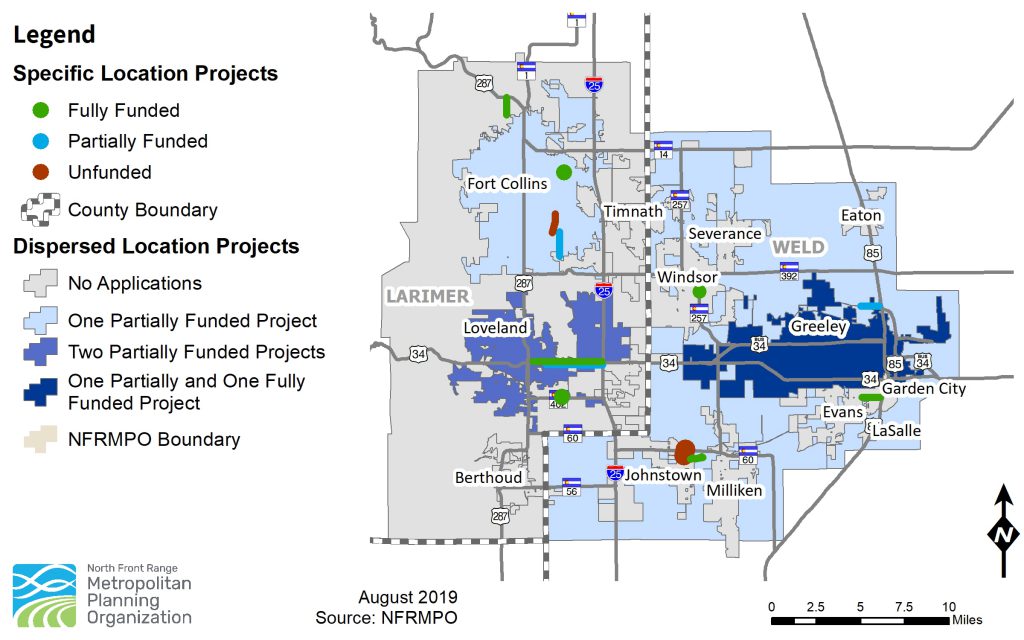
FY2020-2021 Call for Projects Resources
CMAQ Eligibility and Criteria Information
STBG Eligibility and Criteria Information
TA Eligibility and Criteria Information
Tables and Maps of 2040 RSCs and RBCs
2040 RTP Corridor Vision Plan
Congestion Mitigation & Air Quality Improvement
CMAQ funding is used to combat congestion and air quality issues, and is therefore available to communities within non-attainment and maintenance areas. The program began with the efforts of the Clean Air Act of 1990 and was first introduced in ISTEA in 1991. By the end of 2015, CMAQ had funded more than $30 Billion across 30,000 transportation projects nationwide.
In the North Front Range region, CMAQ has been used to fund intersection improvements, transit projects, Compressed Natural Gas (CNG) fueling stations, and vehicles replacements and purchases. In the most recent Call, the NFRMPO funded new CNG buses, vehicles, fueling stations, and trail improvements.
During each call, NFRMPO staff will reach out to project applicants for project descriptions. These descriptions allow staff to calculate emissions reductions, which are important to the scoring process. The higher the emissions reductions, the higher the project should score in the process. The NFRMPO scores CMAQ projects based on first-year reductions, out-year reductions, and cost-effectiveness.
Surface Transportation Block Grant
STBG is the new iteration of the STP-Metro program, which provides transportation funding to highway, bridge, transit, and bicycle and pedestrian infrastructure. The STBG program is the most flexible federal funding source.
In the North Front Range region, STBG has funded intersection improvements, roadway widenings, resurfacing, and bridge reconstruction.
STBG projects are scored in the following categories: congestion mitigation; partnerships and functional classification; safety enhancements; multi-modal enhancements; environmental effects; and local support committed.
Transportation Alternatives
TA is the new iteration of the Transportation Alternatives Program (TAP) and the Transportation Enhancements (TE) program. It is now a set-aside within the STBG program. TA projects are considered on- and off-road pedestrian and bicycle facilities, infrastructure projects for enhanced mobility, historic preservation, recreational trails, safe routes to schools, and construction of boulevards. TA projects in the North Front Range region are considered in collaboration with the NoCo Bicycle and Pedestrian Collaborative, which provides recommendations for which projects should be funded.
In the 2014 Call for Projects, the Colorado Front Range Trail and the Great Western Trail were funded based on the recommendations of NoCo Bike and Ped. Both trails were included in the 2013 NFRMPO Bike Plan.
